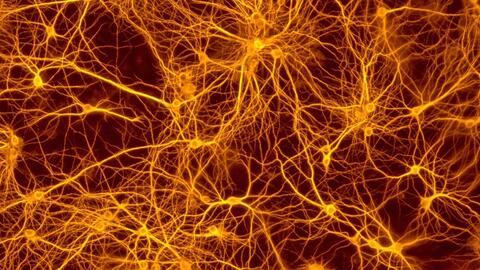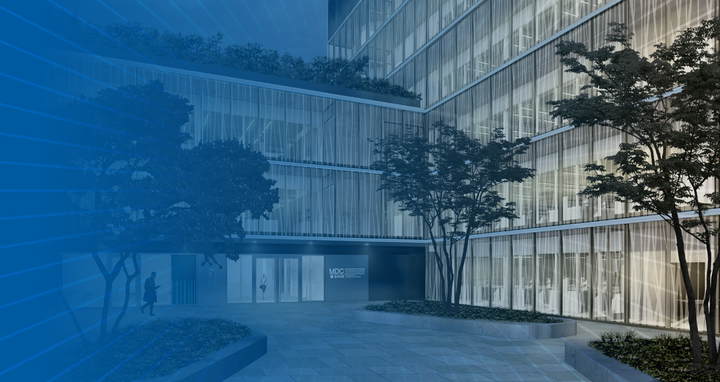The avant-garde of genetic research is now in the heart of Berlin
- Federal Chancellor and state government open new Max Delbrück Center facility
- Research teams are working on single-cell methods, organoids, and artificial intelligence
- Their goal is to develop personalized medicine
A new research building in Berlin Mitte was inaugurated on Tuesday in an opening ceremony that featured an address by Chancellor Angela Merkel, who also met with scientists of the Max Delbrück Center for Molecular Medicine in the Helmholtz Association (MDC). The building will serve as the new home of the Berlin Institute for Medical Systems Biology (BIMSB). BIMSB’s interdisciplinary teams analyze how genes regulate cellular activity. The teams combine cutting-edge methods of genome and single-cell biology with techniques using organoids and artificial intelligence in order to lay the groundwork for the personalized medicine of the future. The Chancellor received a crash course in these new approaches to biomedical research during a tour of the new laboratory, which included conversations with young scientists.

Wissenschaft im Centrum
“We are very pleased that Chancellor Angela Merkel inaugurated our new building in Berlin Mitte,” said Professor Martin Lohse, Scientific Director of the MDC. “Her visit and her interest are an indication of the Chancellor’s appreciation and support for science. This also underlines the expectations that the federal government and society place on us researchers.”
The event took place under the banner of “Science in the center.” In his opening remarks to some 150 invited guests from politics, science, and society, Lohse made clear that this applies not only to the Max Delbrück Center but also to the capital city as a whole. Berlin, like no other city in Germany, is moving science to the center stage in both spatial and substantive terms. “The proximity of the new research facility to Humboldt-Universität zu Berlin (HU) and to Charité – Universitätsmedizin Berlin underscores the MDC’s mission to quickly translate findings from basic medical research – such as the technological breakthroughs in systems and single-cell biology – into effective bedside treatments,” said Lohse.
Investition von Bund und Land
The federal government and the federal states have invested approximately €41 million in the new building on the HU campus. In the past ten years, BIMSB received initial funding from the Federal Ministry of Education and Research (BMBF) and the Berlin Senate as a pilot project under the Cutting-Edge Research in the New Federal States initiative. The funding was made permanent after a successful evaluation by the BMBF. Professor Nikolaus Rajewsky has headed BIMSB since its founding in 2008.
The Governing Mayor of Berlin and Senator for Higher Education and Research, Michael Müller, had this to say about the opening: “The new state-of-the-art location for biomedical research is a great boon for Berlin’s scientific sector. The State of Berlin is proud to have accompanied BIMSB from the very beginning of its journey – a journey that’s seen BIMSB evolve from an innovative idea hatched by MDC scientists to a thriving interdisciplinary research institute. It has provided BIMSB with a total of nearly €6 million in additional funding since the institute’s founding. We would like to extend our thanks to the federal government for funding the newly opened research building. The support exemplifies the close collaboration between the federal government and the State of Berlin. With BIMSB, which has already gained international acclaim, the MDC is playing a major role in efforts to better understand disease and to turn discoveries into new therapeutic approaches tailored to individual patients. This will certainly benefit our city in terms of the healthcare patients receive. I wish the researchers continued success as they begin their work at the new location.”
Traditionelle Grenzen sprengen
Rajewsky said it was a big day for BIMSB: “The avant-garde of biomedical research is working here. We are breaking down traditional boundaries and connecting the disciplines of biotechnology, computational science, biochemistry, molecular biology, and clinical research.” Rajewsky cited single-cell biology as an example. This new field of research, which enables scientists to gain an understanding of how individual cells change over their lifetime, was chosen as the 2018 Breakthrough of the Year by the journal Science – BIMSB researchers have played a major role in the pioneering achievements.
Rajewsky is jointly coordinating from Berlin the European LifeTime consortium with Professor Geneviève Almouzni of the Institut Curie in Paris. More than 50 research institutions across Europe and Israel have teamed up to track what activity our genome undertakes within individual cells over their entire lifespan and to decipher which cellular changes are healthy developments and which lead to diseases. LifeTime will receive a million euros this year from the EU. Brussels will then decide whether the project will be approved as an EU Flagship project, making it eligible to receive up to a billion euros in funding over ten years.
Professor Otmar Wiestler, President of the Helmholtz Association, congratulated the MDC on the opening of its new building: “Helmholtz research plays a major role in solving some of the most important questions facing science and society. The innovative interdisciplinary study of cells at this special place in Berlin will advance many areas of health research – in terms of both basic research discoveries and concrete clinical applications. The work being done here may very well lay the foundations for a new cell-based medicine.”
Architektur für kommunikative Forschung
The new research building was designed by the renowned architectural firm Staab Architekten. Its floor plan accommodates the interdisciplinary approach of the BIMSB research team. A large spiral staircase in the middle of the building serves as the communications hub, and the molecular biological lab spaces are immediately adjacent to the computer-intensive bioinformatics workstations – only a glass wall separates the two. “We are excited about the work that will be done in the new facility,” said Lohse. “This translucent building represents openness and provides the ideal environment for scientific exchange. We also wanted the transparent structure in the city center to serve another purpose, that of making our work transparent to society.”
Further information
Speech of Chancellor Angela Merkel
Report of the federal government
- The Max Delbrück Center for Molecular Medicine (MDC)
-
The Max Delbrück Center for Molecular Medicine in the Helmholtz Association (MDC) is one of the world’s leading biomedical research institutions. Max Delbrück, a Berlin native, was a Nobel laureate and one of the founders of molecular biology. At the MDC’s locations in Berlin-Buch and Mitte, researchers from some 60 countries analyze the human system – investigating the biological foundations of life from its most elementary building blocks to systems-wide mechanisms. By understanding what regulates or disrupts the dynamic equilibrium in a cell, an organ, or the entire body, we can prevent diseases, diagnose them earlier, and stop their progression with tailored therapies. Patients should benefit as soon as possible from basic research discoveries. The MDC therefore supports spin-off creation and participates in collaborative networks. It works in close partnership with Charité – Universitätsmedizin Berlin in the jointly run Experimental and Clinical Research Center (ECRC), the Berlin Institute of Health (BIH) at Charité, and the German Center for Cardiovascular Research (DZHK). Founded in 1992, the MDC today employs 1,600 people and is funded 90 percent by the German federal government and 10 percent by the State of Berlin.





